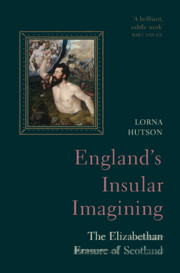Book contents
- England’s Insular Imagining
- England’s Insular Imagining
- Copyright page
- Contents
- Plates
- Abbreviations
- Acknowledgements
- Introduction
- Chapter 1 Writing the Forgotten War I: Henry’s War, 1542–1547
- Chapter 2 Writing the Forgotten War II: Somerset’s War, 1547–1550
- Chapter 3 How England Became an Island: The Faerie Queene
- Chapter 4 Scotland sui juris? Scottish Literature and the Marian Constitutional Crisis, 1567–1573
- Chapter 5 On the Knees of the Body Politic: Scottish Succession and English Liberties, 1567–1608
- Chapter 6 Scotland Un-kingdomed: English History on Stage
- Chapter 7 Race-Making in the Invention of Britain: The Masque of Blackness
- Chapter 8 Divisions and Kingdoms: Oedipal Britain from Gorboduc to King Lear
- Coda: Macbeth. ‘Alas, poor country’
- Works Cited
- Index
- Plate Section (PDF Only)
Coda: Macbeth. ‘Alas, poor country’
Published online by Cambridge University Press: 28 September 2023
- England’s Insular Imagining
- England’s Insular Imagining
- Copyright page
- Contents
- Plates
- Abbreviations
- Acknowledgements
- Introduction
- Chapter 1 Writing the Forgotten War I: Henry’s War, 1542–1547
- Chapter 2 Writing the Forgotten War II: Somerset’s War, 1547–1550
- Chapter 3 How England Became an Island: The Faerie Queene
- Chapter 4 Scotland sui juris? Scottish Literature and the Marian Constitutional Crisis, 1567–1573
- Chapter 5 On the Knees of the Body Politic: Scottish Succession and English Liberties, 1567–1608
- Chapter 6 Scotland Un-kingdomed: English History on Stage
- Chapter 7 Race-Making in the Invention of Britain: The Masque of Blackness
- Chapter 8 Divisions and Kingdoms: Oedipal Britain from Gorboduc to King Lear
- Coda: Macbeth. ‘Alas, poor country’
- Works Cited
- Index
- Plate Section (PDF Only)
Summary
The Coda asks whether Scotland’s undeniable imaginative presence in Macbeth disproves the book’s thesis of erasure. It argues that editors read into Shakespeare’s sources the contrast between England’s political civility and Scotland’s dysfunctional barbarism that is one effect of this brilliant tragedy. Holinshed’s account of Edward the Confessor does not present a society less barbarous than that of Holinshed’s Macbeth, which derives Hector Boece’s elegant Livyan history. Shakespeare evacuates the political-theoretical content of his Scottish sources, substituting the figure of Scotland as a mother unable to nurture her children. Macbeth thus pathologises the Scottish double plight of jurisdictional subordination and alien status with respect to England. The Scottish failure of nationhood becomes a rooted sorrow that even English sovereignty cannot cure.
- Type
- Chapter
- Information
- England's Insular ImaginingThe Elizabethan Erasure of Scotland, pp. 279 - 293Publisher: Cambridge University PressPrint publication year: 2023

